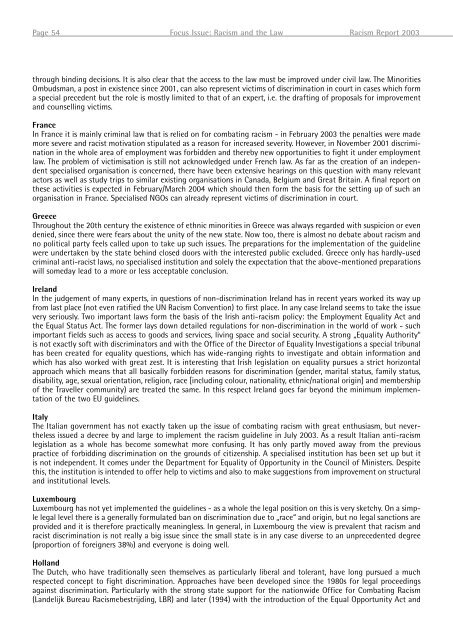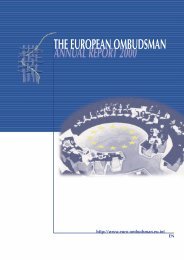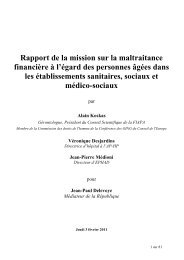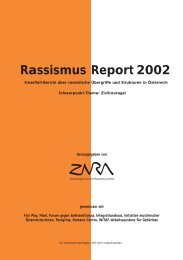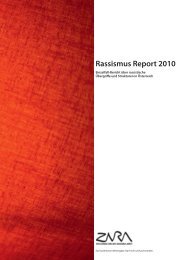Racism Report 2003 - Zara
Racism Report 2003 - Zara
Racism Report 2003 - Zara
Create successful ePaper yourself
Turn your PDF publications into a flip-book with our unique Google optimized e-Paper software.
Page 54 Focus Issue: <strong>Racism</strong> and the Law <strong>Racism</strong> <strong>Report</strong> <strong>2003</strong>through binding decisions. It is also clear that the access to the law must be improved under civil law. The MinoritiesOmbudsman, a post in existence since 2001, can also represent victims of discrimination in court in cases which forma special precedent but the role is mostly limited to that of an expert, i.e. the drafting of proposals for improvementand counselling victims.FranceIn France it is mainly criminal law that is relied on for combating racism - in February <strong>2003</strong> the penalties were mademore severe and racist motivation stipulated as a reason for increased severity. However, in November 2001 discriminationin the whole area of employment was forbidden and thereby new opportunities to fight it under employmentlaw. The problem of victimisation is still not acknowledged under French law. As far as the creation of an independentspecialised organisation is concerned, there have been extensive hearings on this question with many relevantactors as well as study trips to similar existing organisations in Canada, Belgium and Great Britain. A final report onthese activities is expected in February/March 2004 which should then form the basis for the setting up of such anorganisation in France. Specialised NGOs can already represent victims of discrimination in court.GreeceThroughout the 20th century the existence of ethnic minorities in Greece was always regarded with suspicion or evendenied, since there were fears about the unity of the new state. Now too, there is almost no debate about racism andno political party feels called upon to take up such issues. The preparations for the implementation of the guidelinewere undertaken by the state behind closed doors with the interested public excluded. Greece only has hardly-usedcriminal anti-racist laws, no specialised institution and solely the expectation that the above-mentioned preparationswill someday lead to a more or less acceptable conclusion.IrelandIn the judgement of many experts, in questions of non-discrimination Ireland has in recent years worked its way upfrom last place (not even ratified the UN <strong>Racism</strong> Convention) to first place. In any case Ireland seems to take the issuevery seriously. Two important laws form the basis of the Irish anti-racism policy: the Employment Equality Act andthe Equal Status Act. The former lays down detailed regulations for non-discrimination in the world of work - suchimportant fields such as access to goods and services, living space and social security. A strong „Equality Authority“is not exactly soft with discriminators and with the Office of the Director of Equality Investigations a special tribunalhas been created for equality questions, which has wide-ranging rights to investigate and obtain information andwhich has also worked with great zest. It is interesting that Irish legislation on equality pursues a strict horizontalapproach which means that all basically forbidden reasons for discrimination (gender, marital status, family status,disability, age, sexual orientation, religion, race [including colour, nationality, ethnic/national origin] and membershipof the Traveller community) are treated the same. In this respect Ireland goes far beyond the minimum implementationof the two EU guidelines.ItalyThe Italian government has not exactly taken up the issue of combating racism with great enthusiasm, but neverthelessissued a decree by and large to implement the racism guideline in July <strong>2003</strong>. As a result Italian anti-racismlegislation as a whole has become somewhat more confusing. It has only partly moved away from the previouspractice of forbidding discrimination on the grounds of citizenship. A specialised institution has been set up but itis not independent. It comes under the Department for Equality of Opportunity in the Council of Ministers. Despitethis, the institution is intended to offer help to victims and also to make suggestions from improvement on structuraland institutional levels.LuxembourgLuxembourg has not yet implemented the guidelines - as a whole the legal position on this is very sketchy. On a simplelegal level there is a generally formulated ban on discrimination due to „race“ and origin, but no legal sanctions areprovided and it is therefore practically meaningless. In general, in Luxembourg the view is prevalent that racism andracist discrimination is not really a big issue since the small state is in any case diverse to an unprecedented degree(proportion of foreigners 38%) and everyone is doing well.HollandThe Dutch, who have traditionally seen themselves as particularly liberal and tolerant, have long pursued a muchrespected concept to fight discrimination. Approaches have been developed since the 1980s for legal proceedingsagainst discrimination. Particularly with the strong state support for the nationwide Office for Combating <strong>Racism</strong>(Landelijk Bureau <strong>Racism</strong>ebestrijding, LBR) and later (1994) with the introduction of the Equal Opportunity Act and


